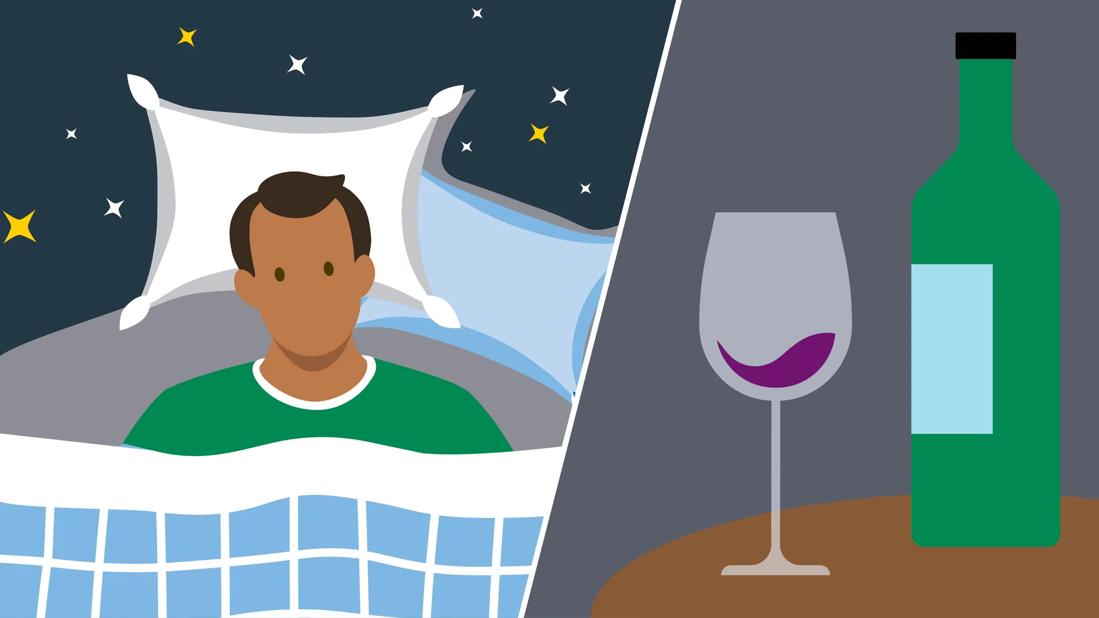A late-night cocktail can disrupt your sleep cycle in a way that undermines the quality of your rest

Image content: This image is available to view online.
View image online (https://assets.clevelandclinic.org/transform/c6e8a492-4407-4b1e-b642-bc46941fbd6f/person-bed-sleepless-alcohol-1435667480)
Person lying awake in bed at night/bottle of wine with empty glass
A boozy nightcap can leave you drowsy and ready for bed at the end of a very long day. But don’t be fooled: Alcohol and sleep don’t mix well.
Advertisement
Cleveland Clinic is a non-profit academic medical center. Advertising on our site helps support our mission. We do not endorse non-Cleveland Clinic products or services. Policy
The work your body puts into processing (or metabolizing) alcohol puts stress on your system that undermines your rest. Your ZZZs during those hours may end up being anything but peaceful.
To learn more, we turn to sleep disorders specialist Nancy Foldvary-Schaefer, DO.
Video content: This video is available to watch online.
View video online (https://cdnapisec.kaltura.com/p/2207941/sp/220794100/playManifest/entryId/1_mij5x3rq/flavorId/1_5f3sgelj/format/url/protocol/https/a.mp4)
Learn the effects alcohol has on sleep from sleep specialist Nancy Foldvary-Schaefer, DO.
Sleep comes in stages (or cycles) at night. Light sleep tends to be more prevalent in the first few hours after hitting the sheets. That’s followed by a deeper cycle of snoozing known as rapid eye movement (REM) sleep.
When you consume alcohol before bedtime, REM sleep typically pays the price.
“Alcohol in your system leads to your sleep being fragmented, meaning your brain briefly wakes up and interrupts your sleep cycle over and over,” explains Dr. Foldvary-Schaefer. “Every ‘awakening’ can send you back to the light sleep stage, and cuts down on your REM sleep.”
That’s bad because the REM cycle is essential for feeling bright-eyed and rested when you get up in the morning. It’s also critical for brain function, memory and mood.
So, even if you nod off quickly after drinking and manage to sleep for eight hours (or more), losing REM sleep means you won’t wake up feeling fully recharged.
“It’s a matter of quality more than quantity,” Dr. Foldvary-Schaefer adds.
Advertisement
Alcohol can also worsen existing sleep disorders. “Almost every category of sleep disorders can be adversely affected by alcohol use, specifically chronic alcohol use,” says Dr. Foldvary-Schaefer.
The list includes:
The simplest way to keep alcohol from interfering with your sleep is to just not drink. Even moderate drinking can negatively affect your health, after all. The World Health Organization (WHO) has declared that no amount of alcohol is safe to consume.
But the reality is that many people choose to raise a glass of beer, wine or liquor out of enjoyment or to toast good times. So, how can you do that with the least amount of impact on your sleep? Dr. Foldvary-Schaefer offers these three suggestions.
Advertisement
Bottom line? If you’re having sleep-related problems, consider cutting back or giving up alcohol. “I’ve had many patients who came back to me after curtailing alcohol use entirely and their sleep disorders resolved,” shares Dr. Foldvary-Schaefer.
Advertisement

Sign up for our Health Essentials emails for expert guidance on nutrition, fitness, sleep, skin care and more.
Learn more about our editorial process.
Advertisement
Sleep masks can help you create total darkness so you can sleep better
To avoid sleep deprivation and shift work sleep disorder, try adopting habits that minimize light exposure and prioritize daytime sleep
Sleep disorders, mental health conditions and other health concerns can all affect the quality of your sleep
Most people fall asleep within 10 to 20 minutes, but if your experience is different, adjusting your sleep schedule may help
Stick to a consistent schedule, be mindful of screen time and work on reducing your stress levels before bed
Napping can boost focus, memory and mood — if you time it right
These devices can help shed light on what’s happening with your body during rest
Keep a dream journal, set your intentions before bed and make sure you’re getting a full night of high-quality sleep
Although it could be used as a moisturizer, this new trend is not recommended
Communicating clear limits helps protect your time, energy and emotional well-being
High cholesterol can be genetic, but testing and treatment can lower your heart disease risk